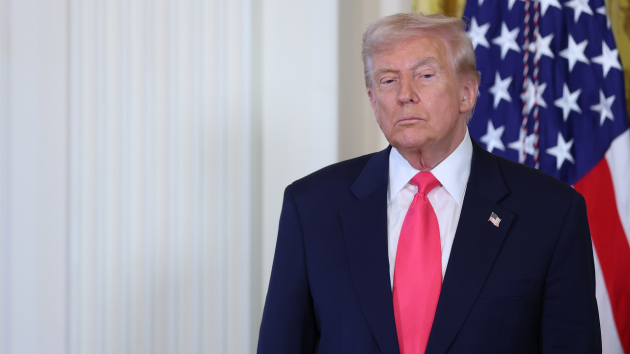Palestinians mourn loss of culture with the rising death toll amid ongoing Israel-Hamas war
Written by ABC Audio. All rights reserved. on April 29, 2024
(NEW YORK) — When Palestinian American Lena Badr learned about the Oct. 7 Hamas attack on Israel, she said she was “horrified and immediately concerned” about what Israel’s retaliation would mean for the Gaza Strip where part of her family resides.
Badr scrambled to reach her family, to send money in anticipation of the hardships ahead: “I knew it would be bad. I did not – I couldn’t have envisioned that it would be this bad,” said Badr.
Since Israel began its retaliatory bombardment of the Gaza Strip, she said two of her family’s homes have been hit with airstrikes.
The massive loss of life in the Israel-Hamas war has wiped out swaths of family lines — and gone with them are parts of the culture they carried, Palestinians say. The loss has become all the more poignant as Arab American Heritage Month celebrations come to an end, while Palestinians mourn their loved ones and they ponder what this growing loss means for the survival of Palestinian culture.
Badr said she has lost 15 family members in the airstrikes, including her grandmother, three aunts, two uncles and seven cousins.
“Palestinian people have always been deliberately silenced, or preferably unheard victims and I’m determined to change that,” Badr said.
“They had names, they had dreams, they had hopes,” she said, listing the names of her relatives who were killed: Aziza Badr, Awatef Badr, Islam Al-Najjar, Abdelrahman Albeheiri, Asmaa Al-Najjar and Akram Al-Najjar, Etaf Badr, Maysoon Albeheiri, Mazen Albeheiri, Mohammad Albeheri, his wife and two young daughters, Tawfiq Albeheiri and Hanan Badr.
Her family members are some of the more than 34,000 people killed and 77,143 injured in Gaza since Oct. 7, according to the Hamas-run Gaza Ministry of Health.
In Israel, at least 1,700 people have been killed and 8,700 others injured in the war, according to the Israeli Ministry of Foreign Affairs.
The massive loss of life in Gaza has wiped out large swaths of family lines — and gone with them are parts of the Palestinian culture they carried: The stories, the history, the memories.
“I always imagine seeing us back together,” said Badr, who has not been able to visit Gaza in years due to the blockade on goods and people imposed by Israel. “My grandmother would end every phone call with, ‘May God bring us together to celebrate things soon.'”
Helga Tawil-Souri, a professor of Middle Eastern and Islamic Studies at New York University, said the rising loss in the war may affect Palestinian culture for years to come and how it gets passed from generation to generation.
“Every song, every dance, every recipe, every expression is itself a form of resistance against our erasure and our obliteration,” said Tawil-Souri. “Culture is also not just simply what is being done in the moment, but what connects us across these sorts of timeframes.”
Ahmed Fouad Alkhatib, a Gazan who came to America as a teen and lives in California, said he has lost 31 family members, his childhood homes and many of the cultural landmarks that shaped his life in Gaza to the war.
Somewhere in the rubble of his mother’s home in Gaza are the photos of his family and his childhood.
“I feel like a part of me is lost,” Alkhatib told ABC News. “I’m just so desperate to [preserve] the memories and the heritage and the connections. If I ever have children, like, I can’t show them what I used to be like, as a child or as a young man.”
Alkhatib watches as photos and videos come out of Gaza capturing the flattened streets he used to walk as a child and teen.
Within a month of the war, more than 100 cultural sites — including universities, mosques, museums and more — across the Gaza Strip were destroyed, according to the cultural research group, Heritage For Peace.
This includes the destruction of the Great Omari Mosque, one of the largest and oldest mosques in Palestinian territories dating back centuries, and damage to Church of Saint Porphyrios, one of Gaza’s oldest active churches.
“You had an endless street full of restaurants and also private clinics — I actually got my braces done in this downtown area,” Alkhatib said.
He continued, “The sheer amount of destruction to the infrastructure is just unimaginable. And yet, even up until the war, it was a beautiful place – still with the blockade, with the restrictions, with all of the pain that people have endured as a result of Hamas’ control over the Gaza Strip, as a result of the multiple wars that we’ve experienced in the last decade and a half.”
The memory of some cultural landmarks, including the Yarmouk Stadium in Gaza City, have been tainted by footage of unrest in the region.
One video appears to show rows of men stripped to their underwear and Israeli soldiers rounding up stripped detainees in Yarmouk Stadium, though ABC News has not been able to independently verify the date of the incident nor the origins of the video.
The Israeli Defence Forces (IDF) neither confirmed nor denied the authenticity of the video, but told ABC News that the video was not released by any official IDF channels and was not filmed by an IDF videographer.
“Layers upon layers of sadness and pain, to see beautiful landmarks not only destroyed, but become symbols for what is so horrible about this war, which is damage, death, destruction and detention, imprisonment and humiliation,” said Alkhatib.
In Washington, D.C., where Badr lives with her husband and children, she has begun pulling out and dusting off the embroidery from her aunt Awatef that has been kept protected and put away for many years.
Her aunt was part of a collective of women who created embroidered goods as a source of income.
She’s pulled out her pillow covers, tissue covers, tapestries and more — placed carefully around her house as reminders of her family and home: Palestine.
“What we are seeing in Gaza is a very immense loss of everything that spoke to the cultural fabric of the Gaza Strip,” said Badr, adding that it feels “impossible to recall an aspect of our culture that has remained untouched by these experiences.”
However, she said, Palestinian culture “is not something that can easily be extinguished.”
Tawil-Souri said that documenting and passing on the culture, traditions, languages and other aspects of Palestinian heritage are vital to protecting Palestinian culture into the future.
“When I look at how I’m raising my son and how we are responding as a family to this conflict, I don’t see us burying our culture anymore,” Badr said. “We will continue to refute this fate of erasure.”
Before this war, Badr said she would represent her culture in a way that is “palatable” to the masses — the cuisine, the art and the hospitality of Palestinian people.
She thought it would keep her safe. Amid ongoing warfare in Gaza, she said it is impossible to divorce the beauty of Palestinian culture from what is happening on the ground.
“Starvation is widespread. Food, diapers, shelter, everything is almost impossible to find and every day presents new challenges people fight for survival,” she said. “It is really important for us to keep the easier parts of the culture intertwined with those realities, because you don’t get one without the other.”
Copyright © 2024, ABC Audio. All rights reserved.





